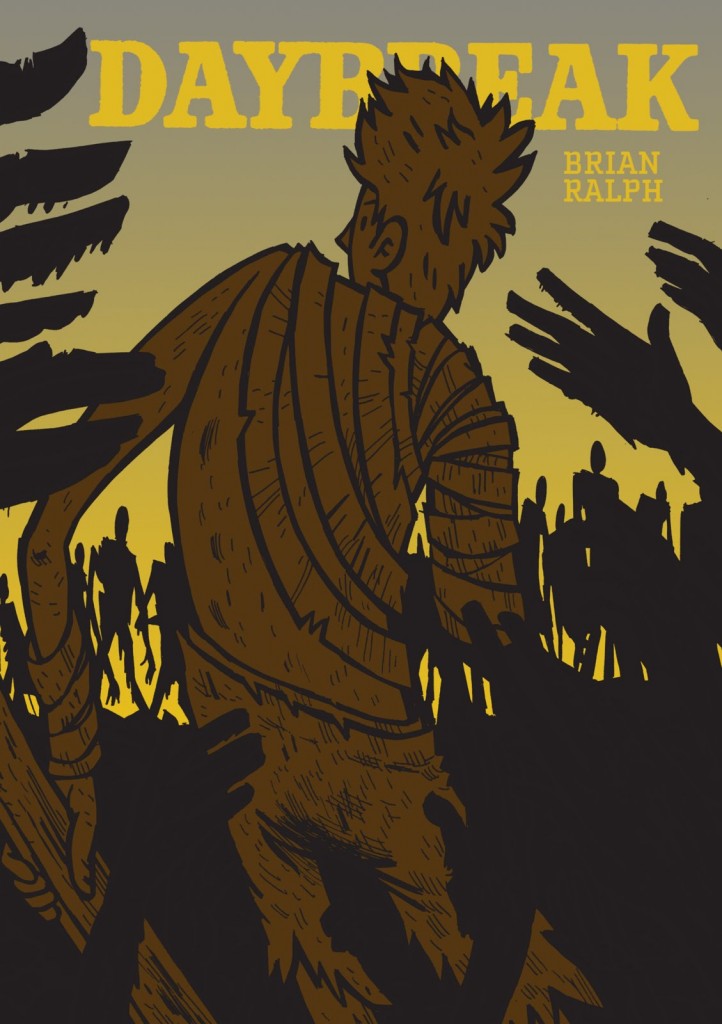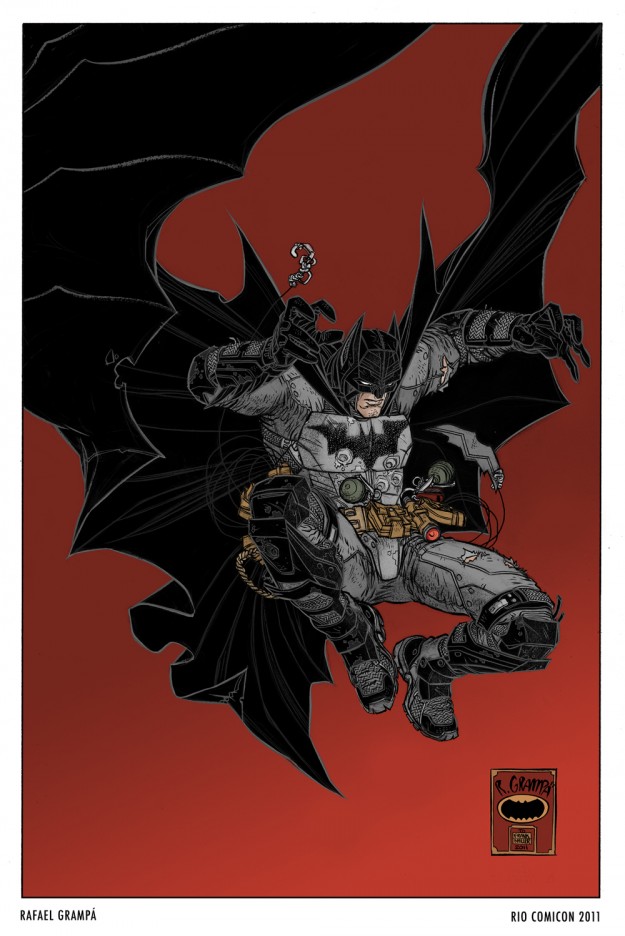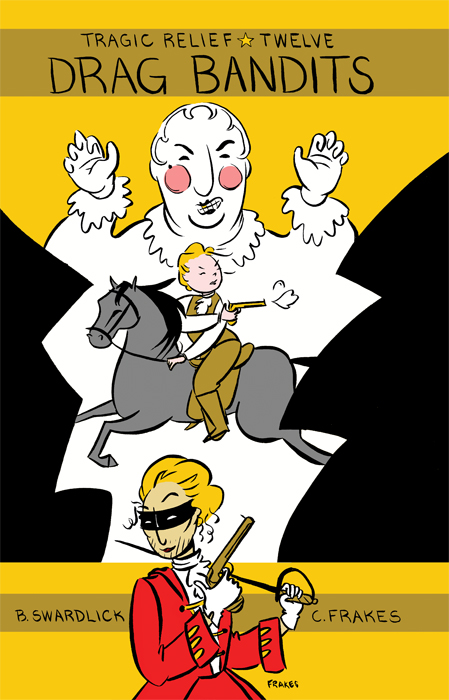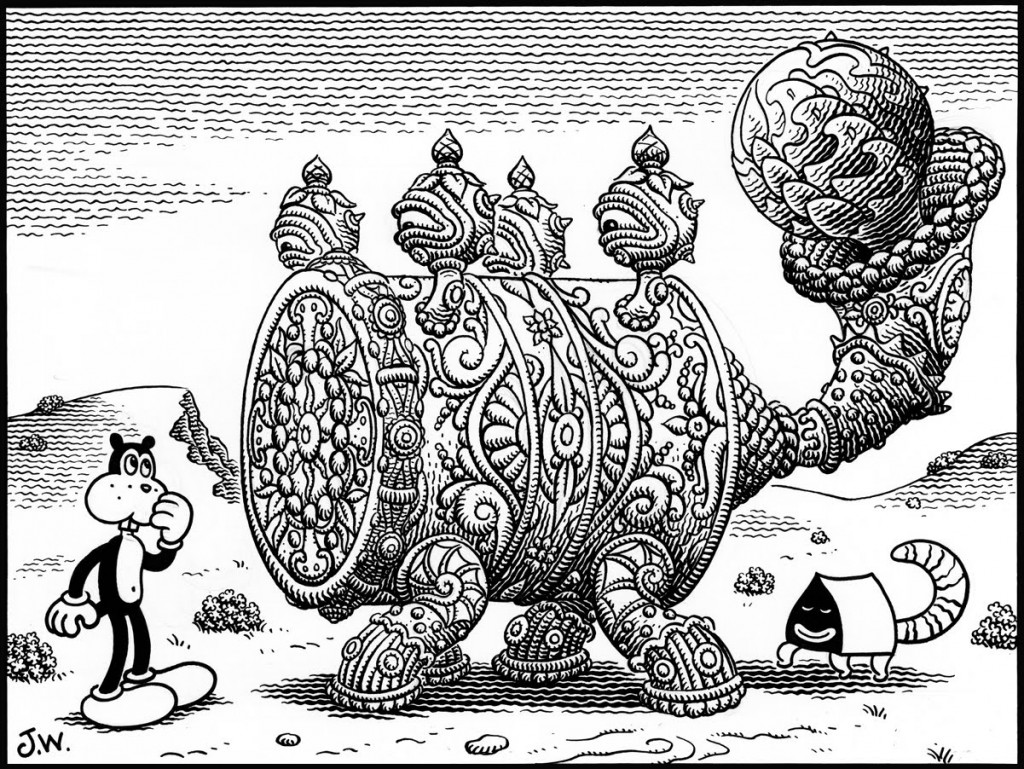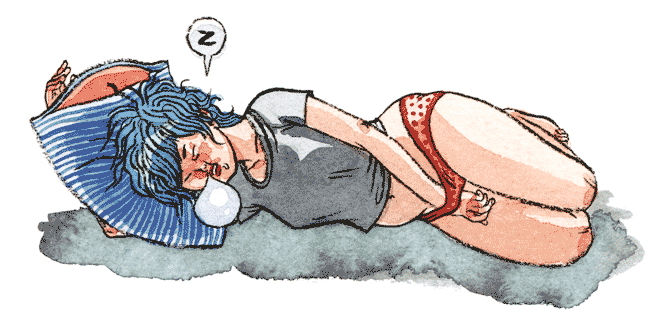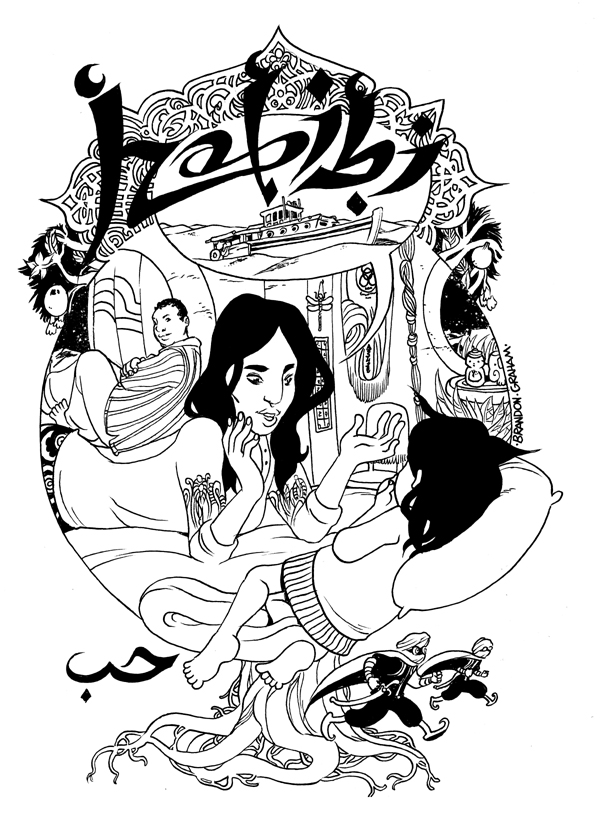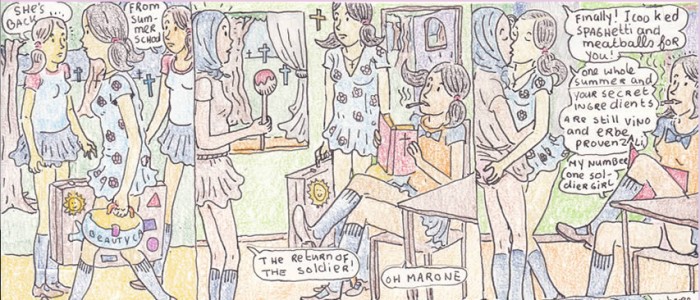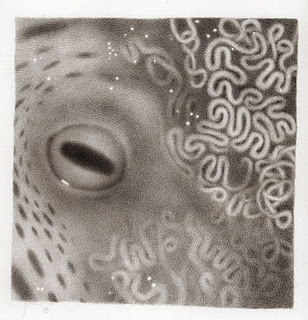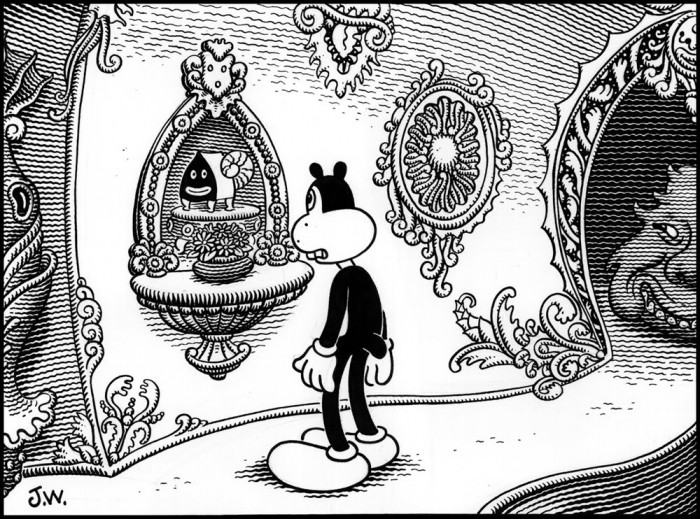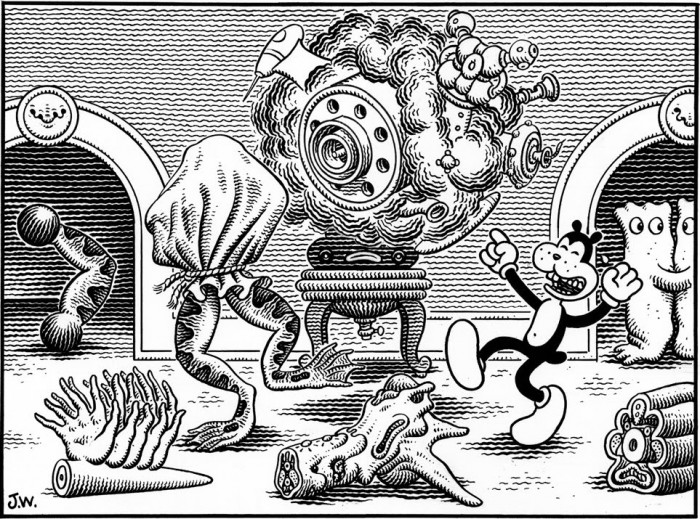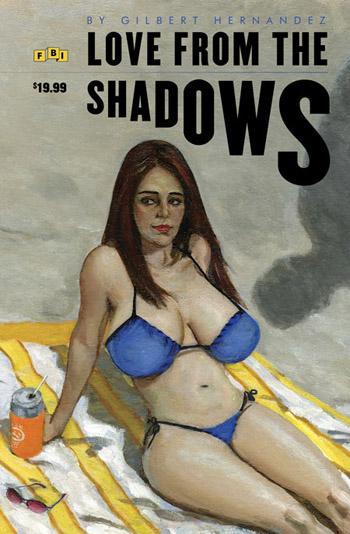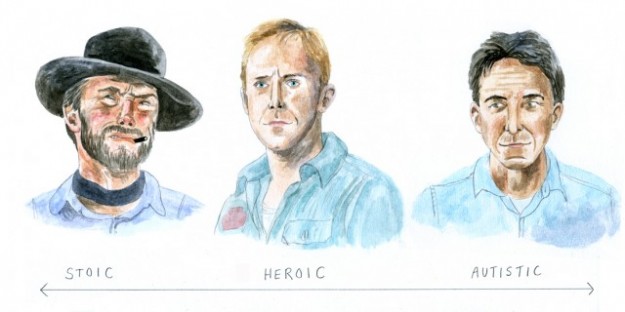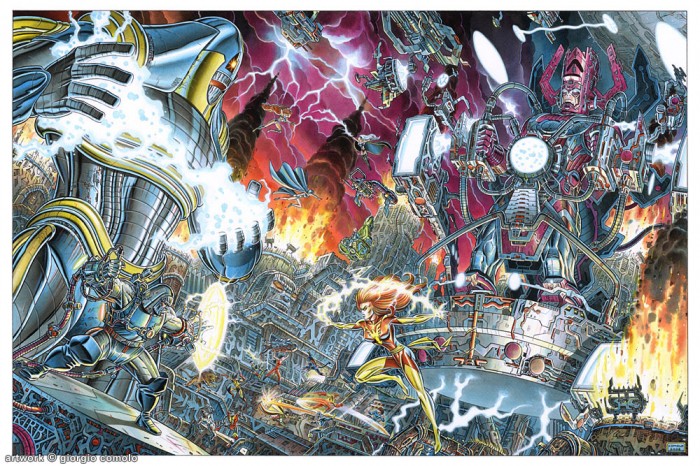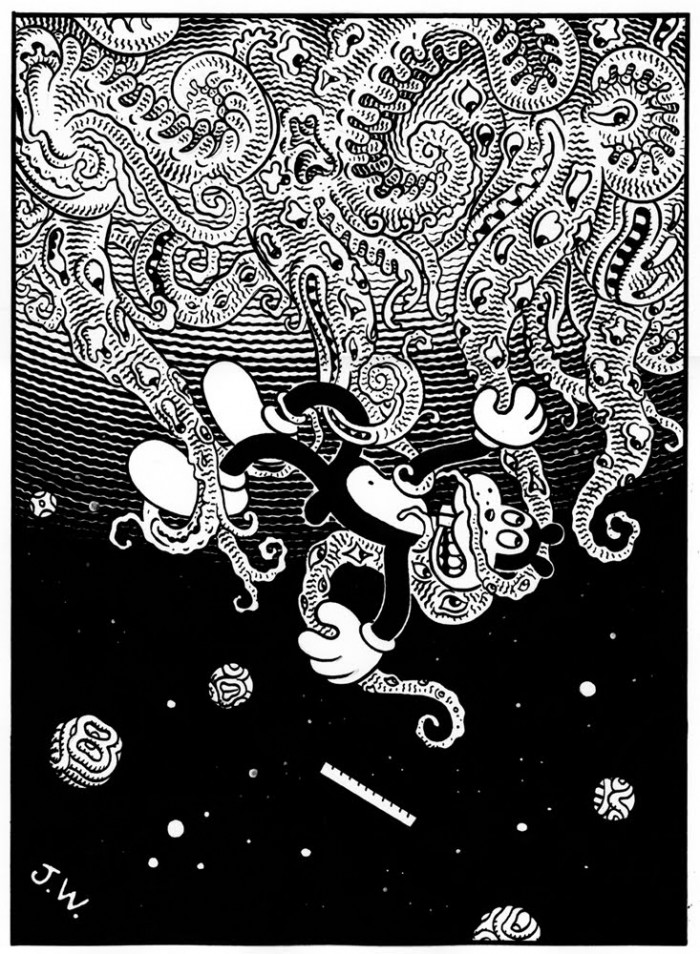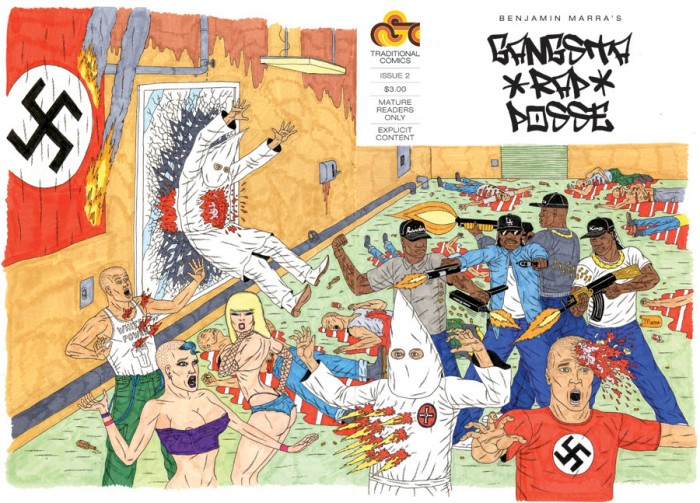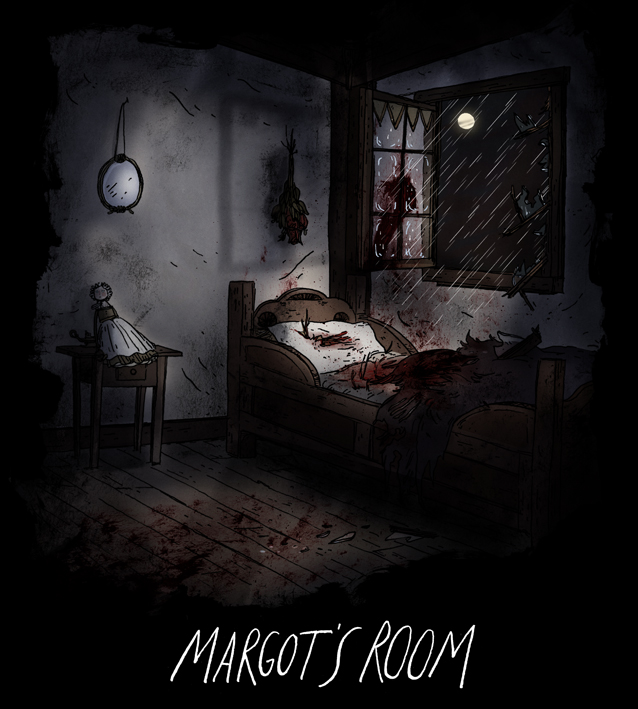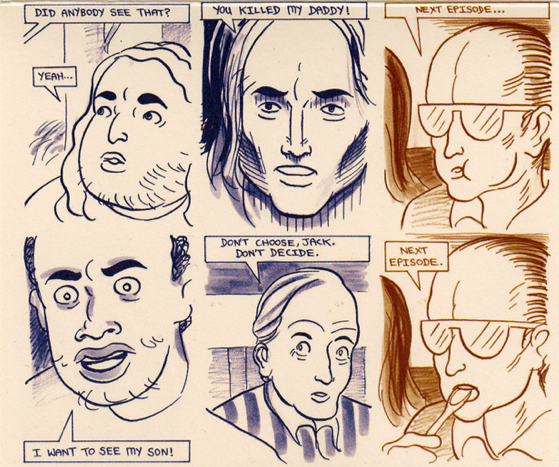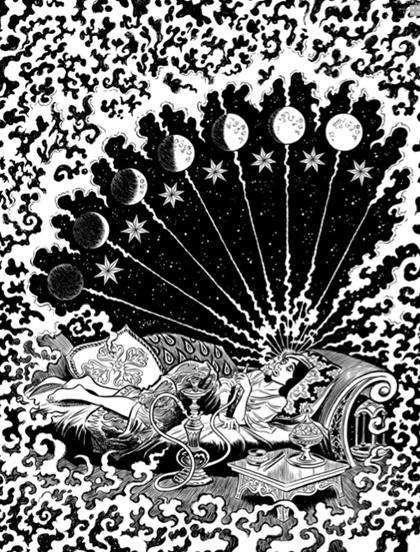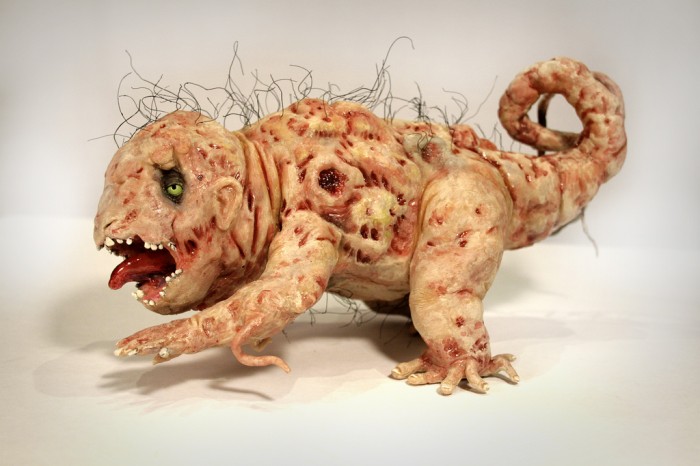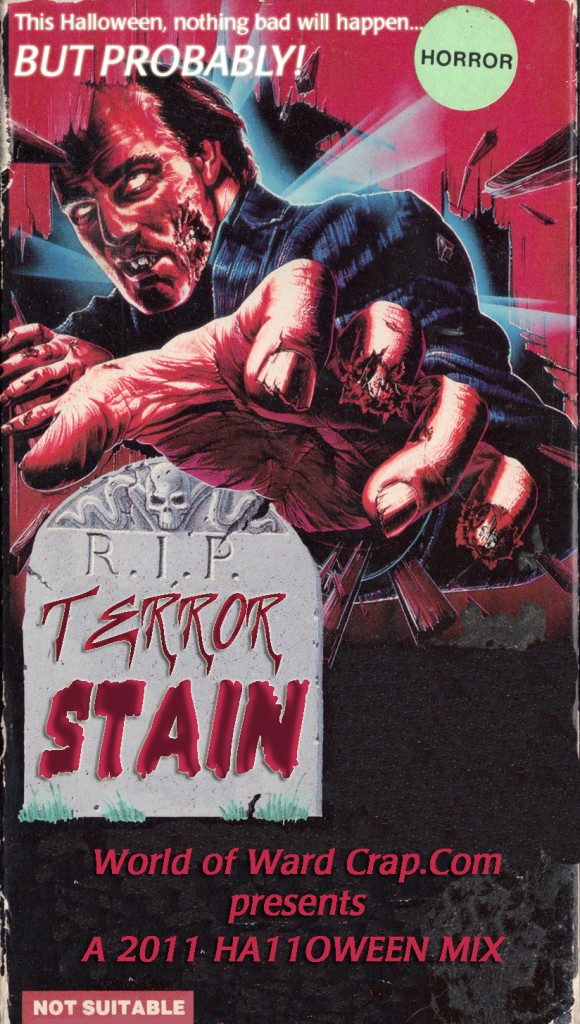Archive for October 17, 2011
Love and Rockets: New Stories #4 is a great comic
October 17, 2011Quick Walking Dead poll
October 16, 2011Is anyone planning to watch the Season Two premiere of The Walking Dead? I’m not, on “life’s too short” grounds. That first season was pretty bad, and there are many, many better and/or more enjoyable shows I can be watching. I’m just curious what y’all have decided. Let me know in the comments if you like.
New York Comic Con report
October 16, 2011I stopped by NYCC on Friday evening. Here’s what I saw.
* The on-site press pass situation is hilarious. Anyone could walk in off the street and grab one if they knew where to look. While I was getting mine, I watched some loudmouth gamer basically annoy a staffer into giving him one for his buddy despite both he and she acknowledging that the buddy was not press. (He walked away saying “Thank you, sweetheart,” like he was Roger Sterling.) All I needed to get mine was the outdated business card I paid $10 for on the internet. “Do you need to see my credentials?” I asked. “Um, okay, if you have ’em,” was the reply. When I actually took them out, she waved them away.
* Best cosplay: Solomon Grundy on built-in stilts. Runner-up: Ms. Marvel With Her Ass Hanging Out. As one commentator put it, “She looks like a Mike Deodato drawing, but in this case it’s okay, because she has agency.”
* From a look at their table, I’m pretty sure the Suicide Girls were 14 years old.
* Some people smelled bad. The rain on Friday did not improve the aroma. I don’t go in for the smelly-nerd stereotype, but for what it’s worth, I pass through Penn Station twice a day every day and don’t encounter the Pigpen-like clouds of stink, so it’s not just a phenomenon of crowds, I don’t suppose.
* I walked past an enormous cosplay group photo session for some anime I didn’t recognize at all. Nerddom is bigger than ever and there are worlds within worlds, man, worlds within worlds.
* The picture of comics presented at this thing makes San Diego look like the Brooklyn Comics and Graphics Festival. I wonder if the show could make a go of building up an alternative or literary comics presence if they put their mind to it. I sort of doubt it. As a NYC metro-area commuter show, it’s competing for those readers with more targeted area cons like BCGF, MoCCA, and even KingCon. For those traveling longer distances, including some of the bigger publishers, the larger East Coast also offers SPX and TCAF. It’s great to see Top Shelf and NBM tabling next to each other, but you’d need Fantagraphics and Drawn & Quarterly at the very least to approach some kind of altcomix critical mass, plus a dedicated programming slate, and no one involved appears to have much interest in that. This is one situation where I think Tom Spurgeon’s frequent suggestion of independent counterprogramming that cross-honors passes from the main event might make a lot of sense, but you’d be fighting for PR oxygen against a show that’s damn near San Diego in size without people’s ingrained inclination to go to San Diego no matter what.
* I spent about two hours walking the floor. I could have spent a lot more than that, hours permitting, I’m sure, because I do enjoy the sheer spectacle of it all. That’s just one of those things you either like or don’t, like how for some people Guinness is too heavy to drink and for others you can knock down pint after pint. But the spectacle is the extent of what it offers, to me at least. The flea market of back issues, original art, t-shirts, toys, and tchotchkes; the big booths hawking video games or wrestling or cartoons or whatever with loudspeakers and music and women in tight clothes; long lines of readers excited to meet Marvel and DC creators; cosplay, cosplay, and more cosplay; Nerd Nation at its best and worst, from happy teen couples to middle-aged men loudly complaining about Ryan Reynolds’s CGI Green Lantern costume and everything in between. I left at closing, knowing I wasn’t missing much by not going back again the rest of the weekend, but also knowing I could probably quite happily spend days and days in there.
* If you like talented superhero/genre artists, then Artists Alley was pretty terrific, if you ask me. I met Chris Burnham and walked past David Lloyd and Geof Darrow, just for example. There were definitely dozens of people hawking sad-looking self-published indy superbooks, but there were also some real talents in there.
* I went to a wonderful party on Friday night thrown by some of the younger Wizard alums that encompassed representatives of Marvel, Dark Horse, CBR, ComicsAlliance, The Comics Journal, Hasbro, Diamond Select, and MTV; scheduling conflicts were all that kept DC, Archaia, Archie, and Newsarama from having staff there as well. We’ve done alright! There and elsewhere, I met for the first time people I’ve talked to online for literally years. For the first time I met Sean Mackiewicz, who had been my source for dozens of DC freelance assignments over the course of two or three years, and Steve Wacker, who’s my editor on the Spider-Man comic I wrote that comes out in a couple weeks. Twice I bumped into my old boss Pat McCallum, who now works at DC but whom I hadn’t seen in years, possibly since the day he left Wizard. Moreover, I think this is what I like best about NYCC: It brings people I know and love in the industry together in Manhattan. It’s a rare case where I really do prefer the socializing surrounding the event to the event itself.
Long Mad Men thoughts
October 13, 2011I believe I am two episodes into Season Three. SPOILER WARNING.
* The key to Don Draper is war. I’ve thought this ever since the pilot episode, before I knew…anything about him, really. There’s a moment in that first hour where he takes a nap in his office, and slowly the sounds of explosions begin echoing in his head. I believe at some point before that we caught a glimpse of his Purple Heart, but that sound cue (effectively cribbed a few years later by Game of Thrones) was the moment when I realized that something happened to him out there, wherever there was. Everything we’ve seen since lends further credence to this notion. Dick Whitman became Don Draper in an explosion in Korea. The prospect of “total annihilation” sends him running from an aerospace conference directly into a lost fortnight of the soul. And I think it’s his candor about the Cuban Missile Crisis making him “sick” in his letter of apology to Betty that precipitates their subsequent reunion as much as anything else. I don’t think I’ve wrestled with this enough to boil down what Don’s experiences in Korea did to him and mean to him to a single sentence, but I promise you it’s not for lack of trying. But I do believe that the hole in Don, the part of Don that’s so hard to define — that hole was created by being blown open.
* My recent experiences with miscarriages, pregnancy complications, premature childbirth, and fatherhood have humbled me by showing me just how beholden to biography criticism really is. Man oh man, am I ever a mark for neglected-baby shit now. Every glass of booze or Lucky Strike that goes into the mouth of one of the pregnant characters is like nails on my mental chalkboard, and when Peggy rejected her baby that first night, or when Betty left the gynecologist’s office without a checkup and then proceeded to do various things he’d instructed her not to do anymore, I had a tough time getting around that with them. The funny thing is that, like my wife, I’m more pro-choice after our ordeal than I ever was before it. I think it’s the noncommittal quality of Peggy and Betty’s ways of dealing with their unwanted pregnancies that bothered me. If Betty had gone to that “doctor in Albany” that Francine told her about rather than simply going horseback riding again like it ain’t no thing, I’d have been much more okay with it and with her. Make a decision, is what I’m saying. I dunno, this shit’s complicated.
* Duck Phillips’s self-immolation was the show at its meanest. The guy’s only crime, it seems, was just not quite playing the game right. Everybody else gets to be a drunk — he has to be an alcoholic. Everyone else cheats — he gets a divorce, and doesn’t even have a 20-year-old secretary to show for it. Everyone else thinks big and takes risks — his big thoughts and risks never seem to pan out. When he finally shoots for the moon, he’s not Neil Armstrong, he’s Gordo the ill-fated space monkey. Sure, I was rooting for Don, and was invested enough in Duck’s defeat to literally shout “He doesn’t have a contract, you dope!” at my laptop screen out loud on the train, alarming the woman in the seat next to me. But even so, watching his seemingly successful office coup and business masterstroke end with his former boss dismissing him by saying “He could never hold his liquor” was a gutpunch. And like that, poof, he’s gone.
* That whole storyline was another terrific case of misdirection by the writers, of course. The entire time Don was wandering around California incommunicado, I anticipated a total meltdown or freakout when he returned to find Sterling Cooper sold out from under him and Duck Phillips calling the shots. Instead he collected his half million dollars, blithely offered to quit, and destroyed Duck’s career with seven syllables: “I don’t have a contract.” It was like one of his “magic pitches” (I wish I remember who introduced that phrase to me), where he has just the right idea at just the right time. He didn’t even break a sweat. He’s a miracle man.
* Betty’s post-adultery rapprochement with Don was one of the show’s few too-predictable moments. They’d been building up to it for so long that I had no doubt Betty would cheat one time only, “getting it out of her system,” in order to welcome Don back to the family. In general I find the supposed epiphanic value of sex to unhappy suburban women overvalued in fiction, as if there’s a whole nation of Joan Allen in Pleasantville out there just one bathtub frig away from Freedom. Still, it could be worse: They could have made like the odious American Beauty and made the housewife’s sexual satisfaction an object of ridicule and contempt. Personally, if you’re gonna go the whole When Hausfraus Fuck route, I prefer the Hellraiser option.
* Less predictable, and much more troubling for that, was the fallout for Joan’s rape by her fiancé. Specifically, there wasn’t any. I expected the Holloway facade to finally crack, but this was no life-altering trauma for her, because this is par for the course. If marital rape (I know they weren’t married yet, but I don’t know an adjectival form for fiancé) still occasionally has a hard time mustering outrage today, imagine what it would have been like then. Like smoking while pregnant or after a pair of heart attacks, perhaps for some people it’s something you don’t even know is bad. It was the show’s most depressing depiction of the era’s misogyny this side of all those avuncular or leering male doctors dispensing unsolicited life advice with each exam. Their lives are not their own.
* People told me Alison Brie’s Trudy Campbell would improve, and lo and behold. She and Pete are so different together, so much more understanding of and genuinely interested in one another’s feelings and opinions, in that first episode of Season Three that it almost feels like a continuity error. But I guess that if you peg it to Pete’s falling out with Trudy’s father and his own mother, you’ve got the precipitating incidents you need.
* Speaking of potentially jarring character transitions, I was a bit surprised to see Don back up to his old poon-hound tricks again with that stewardess in Baltimore before the Season Three premiere was even over. I figured we’d at least see him make an effort to stay faithful to Betty before failing. And yet this felt much less like plothammering to me than…well, I can’t say, but another acclaimed drama of recent years featured a womanizing, hard-drinking leading man who briefly reformed only to lapse back into bastardry when the demands of the writers required it. There — perhaps because the original development felt so well-earned — the reversal felt cheap and trollish. Here it’s another clue in the mystery of Don Draper.
* What makes it all the more puzzling is that both Don’s apology and his subsequent lapse were juxtaposed against two of the clearest indicators that he could well pass the Good Guy test. Don came home to Betty after we learn that he’s friends, close friends, platonic friends, with the woman whose dead husband’s identity he stole. For that kind of genuine, easy affection to develop under that kind of hideous circumstance, Dick Whitman must be some hell of a guy, right? And after he cheats, he discovers that Sal is gay, but subtly makes it clear to him that he has no intention of either outing nor ostracizing him for it. It’s not just that Don’s displaying admirable tolerance for a man of his era, although that’s awesome. It’s that he’s not a hypocrite. He knows how important keeping a secret and playing a part can be, so he doesn’t hold it against Sal. That’s admirable, in its way. (He’s been hard on Betty for being too sexy for others’ enjoyment from time to time — flirting with Roger at dinner, wearing a bikini to the pool — but while I can’t imagine him reacting well to her actual cheating, I feel like these bother him as breaches of decorum rather than as acts of mote/beam optometry.)
* Don to Peggy: “You’re not an artist, you solve problems.” Copywriters, this is our gift. This is our curse.
* Peggy Olson’s A Series of Unfortunate Hairstyles
* No, semi-seriously: Elisabeth Moss is an attractive lady, but in Peggy it’s tough to see. I had a real holy-shit moment recently when I realized that the girl in that uncomfortably intimate Excedrin Migraine commercial that had driven my wife and I crazy for years during Judge Judy was none other than Sterling Cooper’s newest copywriter because the voice and the eyes were virtually the only thing recognizable about her. That commercial is predicated, more or less, on the appeal of being close enough to this dewy-eyed, breathy-voiced young lady to make out with her, whereas Peggy, to me, has been defined by the awkward middle part of her bangs. Even her makeover at the hands of Bob Dylan enthusiast and noted pervert Curt Smith didn’t fix it. Only when she took a swing at reenacting Ann-Margaret’s Bye Bye Birdie performance in the mirror at home was I reminded that hey, my goodness.
* Sterling silver-tongued.
* Another gasp-out-loud-on-the-train moment: The save-the-date for Roger’s daughter’s wedding. The missile crisis material was so effective — it was the first time the show really affected my personality throughout the day, making me nervous and paranoid — that I was looking forward to seeing how they’d deal with Kennedy’s assassination despite its potentially hackneyed nature. Turns out they’re gonna run right into it full speed. This should be interesting.
* Don got to where he is — at the top of his profession, basically untouchable even by the new owners — because everyone respects his creative talent. Creative talent could make you in that world. I don’t give a fuck about fedoras and suits, but that’s something worth getting nostalgic over.
* Is it time to start shipping Don and Peggy? Deggy?
Comics Time: Daybreak
October 13, 2011Daybreak
Brian Ralph, writer/artist
Drawn & Quarterly, 2011
160 pages, hardcover
$21.95
Buy it from Drawn & Quarterly
Buy it from Amazon.com
For today’s Comics Time review, please visit The Comics Journal.
Carnival of souls: Sparkplug, Netflix, Partyka at the Whitney, more
October 12, 2011* Sparkplug Comic Books will continue, under the watch of Dylan Williams’s wife Emily Nilsson, his friend Tom Neely, and his colleague Virginia Paine. They haven’t decided whether or when they’ll be able to start publishing new work, though they’d like to, but they’re continuing to sell and promote the company’s existing, excellent line-up.
* Amazingly, Netflix has backed down off its previously announced plan to divert its DVD subscribers into a separate service with the absurd name Qwikster. I look forward to reading retractions from the folks who wrote that that was secretly a brilliant maneuver. As I said at the time, regardless of the underlying thought process, repeatedly and publicly antagonizing your customers with sweeping business-model changes that make your services more inconvenient and more expensive, delivered first with no real explanation and then with an “apology” that amounted to “sorry for doing that horrible thing, now here’s something even worse, something so bad that I, the CEO of the company doing it, seem on the verge of tears about it” is — surprise! — a bad business move. It was the strangest thing I’d ever seen a popular consumer company do, and now it’s doubly so.
* My chums in the Partyka collective will be part of the Desert Island Comic Zine Party for kids at the Whitney Museum this Saturday afternoon. Sounds like a good time for the little ones.
* Recently on Robot 6:
* Interesting insights into Ghost World and Shortcomings may be found in this Daniel Clowes/Adrian Tomine panel report.
* Bob Temuka’s post on the Jaime Hernandez/Locas material in Love and Rockets: New Stories #4 is appropriately emotional and dead-on. I talk a bit about it here.
* The revived Wow Cool publishing/mail-order outfit is impressive.
* Here’s a very pretty picture of Batman by Rafael Grampá.
* Via everyone: Liquid Television is now online in its entirety, along with related weird animated programs and station IDs from the MTV vaults. That was a real atom bomb of alt-culture for people of a certain age, one that if I’m not mistaken slightly predated Nirvana’s opening of the floodgates for that sort of material and was therefore even more of a cultural category error when in arrived on our teevees between Janet Jackson videos.
* Tom Spurgeon’s nine thoughts on the DC relaunch’s success. Of the batch, I was struck by point six — DC’s newfound insistence on regular shipping will require fill-in slots that should provide better opportunities for new or new-to-the-company creators than the usual miniseries and tryout books — and point nine — the unpleasant-to-much-of-the-online-fan-press tone of many of these successful books will force a generation of journalists weaned on the we’re-all-in-this-together spirit of comics return to cultural prominence in the ’00s to reexamine those assumptions.
* It’s spoilery so I’m staying away (even though it says it’s not spoilery, the first thing they talk about was spoilery as fuck), but Clive Barker talks to his official site Revelations about the recently released Abarat: Absolute Midnight, the third book in his lushly illustrated YA fantasy series. I recommend you read the intro, however, as it details what seems like a hellish last few years for Barker in his personal life — surgery, divorce, death. He’s one of the friendliest people I’ve ever met in this business, hugely generous in spirit, so every time I hear about these things I feel just awful for him. Still, you have to figure that if anyone’s capable of channeling real life awfulness into his art, it’s Clive Barker.
* Box Brown’s Retrofit Comics is up to its second old-school alternative-comic-book-format release, Colleen Frakes and Betsy Swardlick’s Drag Bandits. To paraphrase Barton Fink, I got a feeling we’ll be hearing from that Colleen Frakes, and I don’t mean a postcard.
* What’s Closed Caption Comics member Mollie Goldstrom been up to?
* It bears repeating that Tales Designed to Thrizzle #7 is on the way.
* It also bears repeating that Jim Woodring is posting things like this five, six days a week lately.
* Hellen Jo draws girls masturbating for Vice. These are illustrations for an article on the topic that is the Vice-iest Vice article ever to Vice, so be warned, but still, it’s Hellen Jo drawing girls masturbating. (Via Same Hat!)
* I have no brief whatsoever with “the Milkyway films of Johnnie To Kei-fung,” but this David Bordwell piece on To’s work begins with an explanation of his elliptical storytelling method that should be of great interest to Jaime Hernandez fans.
* Would you like to watch Synth Britannia, the synthpop-focused edition of BBC4’s wonderful series of rock docs, on YouTube in its entirety? Of course you would. (Via Matt Maxwell.)
Two brief Mad Men thoughts
October 11, 2011IT OCCURS TO ME I SHOULD BE SPOILER TAGGING THESE
* I just finished the Matthew Weiner-scripted episode toward the back end of Season Two in which Don Draper has his Los Angeles idyl with the idle rich Eurotrash and their aptly/portentously/heavyhandedly-named scion Joy. While Don’s out there fiddling and relearning not to say no to things he wants (Joy, you are setting a bad example), Rome’s burning in the form of Duck Phillips’s attempt to cement his position, and take over Creative, by having his old British company buy out Sterling Cooper. What I love about this development is probably just long-form fiction writing 101, but here it is:
At the end of Season One, Don was faced with a choice. He could hire an outside applicant to take over his old position as he moved up to partner, with Duck the leading candidate, or he could promote Pete Campbell. Neither Don nor we in the audience wanted him to do the latter, for a number of reasons: 1) Pete was too big for his britches and didn’t seem to deserve the promotion on a professional level; 2) Pete was generally an obnoxious creep even by Sterling Coo standards and rewarding that behavior would have been unpleasant to watch; 3) Most directly, Pete attempted to secure the position through blackmail, and both on a “Crime Does Not Pay” level and in the sense that Don is a more likeable character than Pete, we wanted to see that fail. So Don hires Duck, then ends Pete’s game of chicken by deliberately crashing into him, and finally emerges victorious and more secure than ever. Hooray! In the moment, it looked like he made the right move.
And in the moment, he probably did make the right move! Promoting Pete under those circumstances would have been disastrous for Don, and probably not so hot for the company either. (Or for Pete, I suspect.) But this outcome — which Don selected and fought for, taking a risk and reaping the reward — had the unintended consequence of completely undermining his own happiness and power at the job. (At least I think it will — I haven’t seen how the deal with the Brits turns out yet, as I’m no further than the episode where it was first brought up.) What a great technique for the writers to use: They gave their character what he wanted, but instead of either a happy ending or a pat “be careful what you wish for” as a result, they use it as the seed from which something he absolutely doesn’t want will eventually grow. The Don vs. Duck line emerges not as a direct continuation of the Don vs. Pete line, but off on a tangent we couldn’t have predicted, and one we couldn’t have followed if Don and Pete hadn’t been made to collide in the first place. It’s Curt Purcell’s idea of narrative shrapnel (warning: A Song of Ice and Fire spoilers at the link) writ large. And it’s a great way for writers of serialized fiction to keep their stories going when seeming endpoints are reached.
* As if a film studies major couldn’t have enough fun making hay out of the name “Don Draper,” they went and made his real name “Dick Whitman.” Drop a “D” from the former and add an “e” to the latter and you’ve got an A in the class.
Drive second thoughts
October 11, 2011Maybe it’s just the YouTube of “A Real Hero” talking, but I find myself more warmly disposed toward Drive today than I was when I wrote this. I still feel that when a film of this film’s obvious intelligence dances this close to the whole “down these mean streets a man must go” necessary-violence thing, it’s a lot tougher to get past than when a film of obvious stupidity does so. (I watch Road House a lot.) And I still maintain that the film didn’t push the Driver far enough in one direction or another emotionally for us to have a working context for his violent outbursts. But in retrospect I can see little pointillist moments almost coalescing into something emotionally coherent. His completely unknown past prior to six years ago; the way he draws the line at violence but nevertheless still possesses a familiarity with and talent for the criminal world; the totally convincing viciousness of his threat against the guy he once drove when they bump into each other at that diner; the effortless rapidity with which he adjusts to kill-or-be-killed violence; his obvious guilt over his involvement with Standard’s final criminal act and subsequent death; the slow-mo shot of him looking horrified after he kills the man in the elevator; wearing a mask the one time he intentionally sets out to kill someone; leaving the cash behind; leaving Irene and Benicio behind even though no one’s out to get him or them anymore; even Standard’s lingered-on homecoming speech about how what he did in the past was shameful, but now he’s got a second chance…If I were the theorizing type, my theory would be that once upon a time the Driver was a real rough customer, but he changed, and the events of the film brought out a side in him he’d long suppressed, and so he abandons the woman and child he’s come to care about rather than subject them to it again.
The reason I’d love for this to be a little more than theorizing is not because I need things spoonfed to me — what I’m calling for is more emotional information, not more plot-fact information — but because it would be interesting for the film to have developed the Driver more in this regard. I don’t know if Matt Seneca was kidding when he suggested the film should have shown the Driver crying after he killed the two guys who attacked him and Blanche in the hotel, but amen to that. That’s a scene I’d have liked to see.
But I saw plenty of lovely things. The film was impeccably cast and delightfully acted, from Gosling’s quiet kindness to Ron Perlman grinning Noo Yawk gangsterisms. The ’80s look and sound was luscious and unpretentious. The violence was refreshingly hideous, mitigating against the redemptive role it plays in the narrative. And even if it didn’t quite get there emotionally, I do feel like it tried, and it had enough other things going for it that, to a degree at least, it can be forgiven for stopping short of where it needed to go. In many ways my entire life up until this point has put me on a quest for sad trash, and Drive comes pretty close.
Carnival of souls: Special “Must Reads” edition
October 7, 2011* Must read #1: This piece on Juan Carlos Fresnadillo’s 28 Weeks Later by Glenn Heath Jr. for Not Coming to a Theater Near You is the best review of that movie I’ve ever read. It just gets everything about it right.
* Must read #2: Rob Clough on virtually all the comics of Michael DeForge. A thorough examination of the best young cartoonist.
* You can now purchase <i>Thickness #2, the erotic comics anthology edited by Ryan Sands and Michael DeForge, and Chameleon #1, the god-knows-what anthology spearheaded by Jesse Balmer and Jonny Negron, at their respective websites, and I don’t see why you wouldn’t.
* Over at Robot 6 I used this Brandon Graham Habibi tribute as a springboard for all sorts of related links: More Habibi pro fanart at Floating World, Nadim Damluji’s essay on Habibi and Orientalism, the Inkstuds video interview with Brandon Graham, and more. Click on over and check ’em all out.
* Comics distributor Haven has shut down. As George R.R. Martin might put it, the Direct Market for comic books in North America is now a monopoly, or near enough as makes no matter.
* Laura Dern is trying hard to persuade David Lynch to direct another movie. Related: Man did I have a crush on her circa Jurassic Park.
* Jeez, this webcomic slechtemeisjes that Kevin Czap uncovered is stunning. He says the resemblance to Henry Darger is coincidental, which is also stunning.
* Randall Munroe channels Uno Moralez.
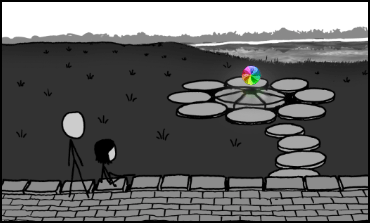
* Jesus, Renee French.
* Jim Woodring has been killing it lately.
Drive thoughts
October 7, 2011SPOILERS AHOY
You’re right, I am quite imaginative with my post titles. Thank you!
As the credits rolled and I contemplated the final decision made by the Driver as depicted in the final two shots, I thought to myself, “At this late stage, with all the other players eliminated, why wouldn’t he choose to go back to Irene and Benicio, if they’d have him?” I think I might have an answer, about which more later, but my main internal response to that question was just to shrug and wonder how you could really know anything about this guy as written.
“By their works ye shall know them” is a decent standard to apply to fictional depictions of bastardry and brutality, I think, but there was simply no way to apply it to the Driver in any way that made sense. Though he exuded a crinkly-eyed, quiet kindness throughout the film, especially in his tender interactions with Irene and Benicio but more revealingly with Shannon and especially Standard, and though he repeatedly insisted upon remaining an unarmed and inactive participant in the crimes he facilitated as the driver, he’s suddenly Jason Bourne at the drop of a hat when threatened. Not only is he a ruthlessly efficient killing machine, he’s cruel on more than one occasion: threatening to torture Blanche, actually torturing Cooke.
The problem on a structural level is that his actions, in and of themselves, are virtually indistinguishable from those of Bernie Rose, an equally proficient and brutal murderer who, like the Driver, does not seem thrilled about having been placed in this predicament. But Bernie’s clearly a bad guy by the standard of the film — as Benicio might say, just look at him, does he look like a good guy to you? But that distinction, between the good savagery of the Driver and the bad savagery of Bernie, is unearned. I know what Bernie is because of what I see him do. I see the Driver do similar things but I’m supposed to “know” that he’s something else. Is he?
I suppose you could say that that slow-motion shot of the Driver as he stares in apparently guilt-stricken horror at Irene after he crushes the guy’s skull in the elevator, coupled with the rivers of flop sweat pouring down his face as he confronts Nino over the phone while holding a hammer to Cooke’s head, is an indication that the Driver is deeply uncomfortable with the violence he’s forced to perpetrate. If that’s the case, then it follows that he leaves Irene and Benicio behind out of concern that he’s no good for them, even though they’re unlikely to be menaced by gangsters anymore. But his unthinking skill in this department, and those flashes of cruelty, are really hard to square not just with his niceness to his friends, but with all our other knowledge of his character — the hardworking kid who showed up at Shannon’s shop and worked for a song, the talented driver who doubles for the star of the movie and persuades gangsters to invest hundreds of thousand of dollars in a potential racing career, the getaway driver who limits his involvement with heists to five minutes of nonviolent chauffeuring.
The answer to the riddle is likely that the Driver’s just a type. He’s the reluctant hero, the good man forced to be a hard man. But while I can accept all of Drive‘s other thoughtful, beautifully executed homages to the Hollywood tradition — the Risky Business/Body Double score, the Taxi Driver lights in the windshield, the Lost Highway/Mulholland Dr. Weird Los Angeles vibe, the Man With No Name near-mute nameless protagonist, whatever — I have a hard time accepting a movie-person in place of an actual person. I didn’t used to, but I think I do now. I feel like the movie knew it needed to make the violence really horrifying to deflate the surrounding Coolness, and I’m glad it did, but I don’t think the emotional violence was commensurate. And to the extent that our satisfaction with the movie hinges so much on an emotional connection with those final shots of Irene knocking on the Driver’s door to no avail and the Driver driving away, a lack of emotional veracity elsewhere blows a hole in the whole thing.
Mad Men thoughts: Special “sex and violence” edition
October 6, 2011* I’m currently seven episodes into Season Two, I believe.
* Sex: Has there ever been a show this effectively and uniformly sexy in its sex scenes? I am no more the kind of person who says “The sexiest thing is what you don’t see” than I am the kind of person who says “The scariest thing is what you don’t see” when discussing horror movies. I mean, grow up. But nearly every sex scene on this show compares so favorably to the pneumatic breast-bearing cheek-clenching sweat-drenched thrustfests on comparable pay-cable programs that I’m starting to wonder if I should reconsider that position. Look, I like seeing attractive naked people, especially attractive naked women, I’m certainly not going to lie about that. And if we lived in an alternate universe where HBO had picked the show up after all, I’d reblog an animated gif of a nude scene involving virtually any of Mad Men‘s female cast members and cameo players so fast your head would spin, I don’t care how confused the readers of Superheroes Lose would get. But it seems as though the show’s necessitated focus on buildup and afterglow, anticipation and satisfaction, forced them to become peerless portrayers of desire and arousal. These, of course, are the hottest things about sex. You can see naked people in all sorts of contexts, but you can really only see truly turned-on people tear into one another in just the one. It’s in that glimpse of the performance of desire, and the subsequent glimpse of its fulfillment, that the erotic really lives. Bobbi Barrett isn’t even my type, but the scene in which she’s lying in bed face-down with Don face-down in turn on top of her, both of them panting and sweating after a job well done, as she talks about the air-conditioned sensation of being both hot and cold and then asks Don, basically, not to take his dick out of her yet…shit, man, that’s one of the sexiest things I’ve ever seen on TV.
* Violence: Would you believe that for the longest time, as I promised myself I’d watch this show but never got around to it, I worried that I’d somehow find it less compelling because the main characters are advertising executives rather than mafiosi, medieval knights, cops and drug dealers, cowboys, outer-space soldiers and killer robots, gun-toting crazy people stranded on an island someplace, and thus the chances that someone might get killed during any given episode were much, much slimmer? To be clear here, what worried me was what that would say about me, not about the show. I am so used to drama in which the ability of characters to kill other characters provides an instant high-stakes atmosphere, an array of dramatic story possibilities and emotional consequences, that I wasn’t sure how I was going to handle one in which the worst that could happen was, I dunno, someone gets fired or his wife leaves him or whatever. Now, if you look at my comics-reading habits, I have no preference for violent fiction; if anything it’s the contrary, as the sort of reading habits that privilege action-based genre work of whatever sort to the sneering exclusion of so-called New Yorker navel-gazers are perhaps my biggest pundit pet peeve. My prose reading list works in much the same way, though I do less prose reading and thus it can get a bit more lopsided toward violent genre work depending on what I made a point of plowing through recently. But for some reason, I’d be hard pressed to tell you the last movie I saw in a theater or on DVD in which someone wasn’t violently assaulted or killed. With TV it’s an even stronger bias, because one of my favorite aspects of all my favorite millennial shows is my uncertainty that any given character will live to see the end of any given episode. With Mad Men, by contrast, I’m reasonably sure no one will shoot Joan Holloway in the head at any point. Of course, it turns out that that certainty doesn’t hurt my enjoyment of the show in the slightest, and I’m just as capable of loving the narrative and execution here as I am in a Chris Ware comic. And the absence of violence as an ingredient in the everyday lives of these characters as opposed to the characters on Lost, Battlestar Galactica, The Sopranos, The Wire, Deadwood, or even Twin Peaks means that when the threat of physical harm does arise, be it intentional (the possibility that Don might kill his half-brother to shut him up, Don’s brief shoving match with Betty during their disagreement over corporal punishment, Don’s really unpleasant quasi-sexual-assault on Bobbi when he threatens to ruin Jimmy if he doesn’t apologize to the Utz owners for insulting them) or accidental (Don and Bobbi’s car crash, Bobby Draper burning his face on the stove), the bottom of my stomach really drops out.
* Just noticed this as I wrote that last sentence: Bobbi and Bobby.
* Speaking of Bobby: God, the Draper kids are just crushingly cute, somehow without being cutesy. Another absurd casting coup. When Bobby said to Don “We’ve got to get you a new Daddy”? Oh man, I’m getting choked up just writing it out.
* And speaking of that line: It’s possible I just wasn’t paying the proper amount of attention, but it seems to me like Season Two emphasizes the killer quotables more than Season One. I’m thinking of “We’ve got to get you a new Daddy”; “You’re garbage. And you know it” ; Don encouraging Peggy to power through her psych hospitalization by saying “It didn’t happen. It will shock you how much it didn’t happen”; Trudy asking Pete that if they don’t have a baby, “What’s all this for?”, and Pete replying “I don’t know.” I certainly don’t mind.
* And speaking of Trudy: I hate to say it, but Alison Brie is maybe…miscast? I love her on Community, and obviously she’s one of the prettiest people on television, but her broad brittleness works for comedy — particularly for a caricature like Adderall Annie — in a way it just doesn’t for drama. Certainly not for maybe the broadest and brittlest role on the show to begin with. There might be a way to bring some extra shading to that status- and baby-obsessed nag (not that the two obsessions are at all separate, mind you!), but Brie has yet to find it at this stage.
* Close your eyes and Vincent Kartheiser sounds almost exactly like Steve Buscemi.
* Every once in a while — and I mean every once in a while, not all the time — I’m able to see past the suits and dresses and smart hairstyles like they’re some kind of Magic Eye poster and see the twentysomething kids underneath the Sterling-Coo staff and their significant others. I spent my twenties feeling like I was playacting being an adult, and I damn sure didn’t wear a suit unless someone was dead or getting married, so that’s the experience I’m bringing to the table when evaluating Pete’s ambition or Ken’s good-time sexism or even Betty’s Donna Reed routine. The contrast may not be quite as striking as it is with the medieval-realistic ages of the characters in A Game of Thrones (the book, not the show) but it’s still pretty damn striking. I’m glad I’ve never been didn’t forced to perform adulthood the way they needed to/wanted to.
* Like Ray Wise, Grace Zabriskie, and (er) Robert Blake before him, Patrick Fischler, aka the Winkie’s dream guy from Mulholland Drive, will forever emit a dark luminosity that is the price of proximity to something terrifying that David Lynch directed. Every time I see his crass and unfunny dinner-jacket insult comic character Jimmy Barrett, I half expect some horrible person from another place to emerge and drive everyone insane. The funny thing, though, is that I first started thinking of him in these terms before his sudden snap into the rawest fury we’ve ever seen from anyone on the show, when he confronts Don about having an affair with his wife. With the flip of a switch he goes from jocular overbearing ballbuster to a curdle-faced desire to utterly annihilate another human being with words: “You’re garbage. And you know it.” The furrow-browed incomprehension on Don’s face was astounding. This is a man far more accustomed to the fawning treatment he received earlier in the episode from the unctuous English Cadillac salesman than he is to somebody telling him “You know what? Your constant terrible behavior does in fact make you a terrible person!” That the messenger was as big a creep as Jimmy Barrett — that Don’s conduct is so loathsome that it has the power to genuinely hurt and disgust even a guy like that — only made it worse. It was a knockout moment.
* The big question for me right now is a related one: What turned Don into Don? I get why he ran away from his past, why he adopted his new identity, but why play it this way, with the heaping helping of amorality? Especially because he doesn’t seem like a bad guy inside? I mean, it’s not just that he obviously cares about his wife and kids — so did Tony Soprano — it’s that the knowledge that what he’s doing would hurt them if they knew about it seems to genuinely be weighing on him. He’s not just thinking of their feelings as pesky inconveniences. Even when he offers to run away with Rachel after Pete finds him out, it’s clear he’s motivated by terror so profound it’s overwhelming his feelings about his family, not that those feelings are ephemeral. (I think that in many ways he hates the life he’s formed with and around his family, but he doesn’t hate Betty, Sally, or Bobby.) So what gives? Is it really as simple as Bobbi’s claim that you find a job and then become the person that does the job, and the person who does Don’s job must needs be a dick?
Comics Time: Love from the Shadows
October 5, 2011Love from the Shadows
Gilbert Hernandez, writer/artist
Fantagraphics, 2011
120 pages, hardcover
$19.99
Buy it from Fantagraphics
Buy it from Amazon.com
For reasons unknown to me, I did not create a Comics Time entry for this review, which was posted on April 20 at The Comics Journal. I’m just rectifying the situation now. Please visit TCJ.com for the review.
Carnival of souls: Robot 6 roundup, Crisis crisis, Image goes day-and-date, more
October 4, 2011* Recently on Robot 6:
* Did you know that Michael DeForge launched a webcomic last month? I didn’t, and I even linked to one of the episodes. (Which I wouldn’t have posted in its entirety if I’d realized it wasn’t just an excerpt from some other project. Sorry, Michael!) It’s called Ant Comic and there’s a new installment every other Monday. So far it’s been pretty troubling.
* Brigid Alverson interviews Box Brown on his alternative comic book throwback publishing outfit, Retrofit Comics. It’s the most revealing piece I’ve yet read on Retrofit, with lots of interesting details about how the sausage is getting made. The insight on the relative costs of printing versus shipping is worth the price of admission alone.
* All of DC’s “Crisis” mega-events no longer happened in the new DC Universe. Dan DiDio announced this on Twitter over the weekend a month after the relaunch began, which is how things work when you’ve planned a relaunch since October 2010, I guess? To me, more interesting than the continuity questions this raises is what this means for DC’s view of and future marketing of book collections containing the Crisis comics. When the company last rebooted its decades-long storylines this thoroughly, with Crisis on Infinite Earths 25 years ago, book-format collections were basically a non-factor. Now they’re a huge part of DC’s business, and historically the publisher has been better at packaging and promoting (and heck, just keeping in print) its major books from throughout its history. Obviously all those stories still exist just as you remember them, and one’s enjoyment of them has nothing to do with what’s going on now — but comic fans tend not to see things that way. Now, neither DC nor its retail partners can point to Crisis on Infinite Earths, Identity Crisis, Infinite Crisis, or Final Crisis as books you “need” to read to understand this or that, or as an intro course to the DCU, and future reprints can’t count on that sense of “this happened!” urgency to get themselves over. I wonder what they’ll do with them.
* The move’s also noteworthy given just how big a part of Dan DiDio’s tenure at the company books with the word “Crisis” in the title have been. The Brad Meltzer-written Identity Crisis served as a sort of statement of purpose for the then-new DiDio regime, reintroducing the “Crisis” concept, injecting a kind of troubling degree of sexualized violence into the DCU, and more or less kicking off the new event-comic era. Infinite Crisis was the first full-fledged line-wide crossover either of the Big Two superhero publishers had done in years, and marked the ascent of writer Geoff Johns to the top of the industry. Final Crisis was a somewhat stickier wicket: Grant Morrison’s take on the line-wide event was one of his most divisive books ever, and though it sold well, by the time it wrapped up DiDio was publicly making fun of it during convention panels. Still, it set up Morrison’s well-received and high-selling Batman run of the past several years, especially the storyline involving Bruce Wayne’s “death” and return; since Morrison has basically been allowed to continue writing Batman with his continuity unchanged, who knows what to make of Final Crisis‘s retconning?
* Lisa Hanawalt reviews Drive. Saving this one for later.
* Gahan Wilson says there’s no sexism among the male and female New Yorker cartoonists. That’d be nice!
* Finally for the Robot 6 roundup, I posted a few more thoughts on Emily Carroll’s new webcomic, Dash Shaw & Jesse Moynihan’s old Lost comic, and Benjamin Marra’s new Gangsta Rap Posse issue over there.
* Image Comics is going same-day digital with its monthly comics offerings, through the retailer ComiXology. As Tom Spurgeon put it at the link, “the specter of total Direct Market collapse as soon as comics gained same-day availability has been punched in the face and pushed out of the moving car by DC Comics with their New 52 initiative.” That’s a heck of a phrase-turn, but I think at this early juncture it’s only dispositive in terms of retailer jitters, not the long-term health of brick-and-mortar stores and other print outlets.
* Joe “Jog” McCulloch on the comics of David Lynch, plus various new releases of note.
* Man, that Giorgio Comolo guy sure can draw Kirby characters.
Carnival of souls: Gangsta Rap Posse #2, Emily Carroll, more
October 3, 2011* Good new comics news #1: Benjamin Marra has released Gangsta Rap Posse #2! It looks like this:
* Good new comics news #2: Emily Carroll has started a new webcomic called “Margot’s Room.” The way it works is that you click the objects listed in the text at the top of the landing page to read it.
* Good not really new comics news: Frank Santoro’s interview with Forming author Jesse Moynihan for the Comics Journal contains, in its entirety, the Lost-inspired comic “Spiritual Dad” that Moynihan and Dash Shaw did for The Believer a while back. Just scroll down.
* Did you know Brian Chippendale has a prose science-fiction short story blog?
* Here’s a sentence I’m excited to write: Matt Zoller Seitz interviews Community creator Dan Harmon.
* David Allison (aka Illogical Volume) connects Darkseid to the inescapable gravitational maw of contemporary capitalism as part of The Mindless Ones’ month-long series of essays on bad guys. What I like about this essay is that it makes Darkseid a lot more dangerous an idea than if we regard him as simply a celestial fascist, one of “those guys,” the obviously evil goosesteppers no self-examination is required to oppose. As much as I enjoy Final Crisis, no one was ever likely to come down on the “oppression” side of “freedom vs. oppression.” The original Jack Kirby conception of Darkseid and Anti-Life as war itself, whereby any violent opposition to Darkseid is itself Anti-Life, is a much stickier proposition, as is Illogical Volume’s suggestion of a humanity-devaluing socioeconomic program so pervasive that opposition is all but literally unimaginable. That’s the hallmark of a good dystopia, after all: No chains required.
* The CBLDF puts the Comics Code’s head on a stick and mounts it on the city wall.
* Craig Thompson, Habibi, Arabian Nights, Orientalism.
* The end of the first paragraph in Graeme McMillan’s brutal drubbing of Frank Miller’s Holy Terror may be the most devastating line I’ve ever read in a comics review.
* Another wonderfully weird image/gif gallery from Uno Moralez.

* This is a sculpture of a creature from Stephen Gammell’s Scary Stories to Tell in the Dark illustrations, by Kezeff. It is marvelous.
* Real Life Horror: The President can have Americans killed without charge, trial, or conviction at any point around the globe now, apparently, so that’s pretty fucking exciting.
* Finally, start your October off right with TERROR STAIN, the latest in Chris Ward’s annual series of Halloween mixes.

